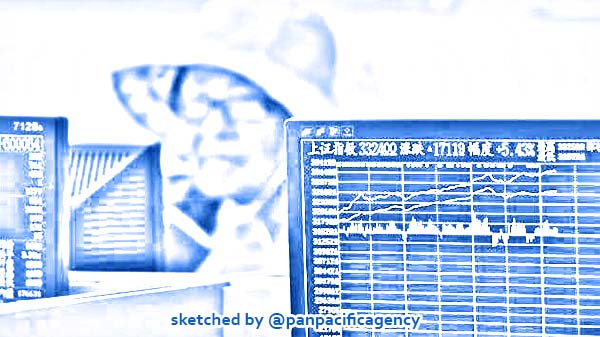Shanghai, Shenzhen stocks jumped amidst China told citizens to buy stocks

An investor watches computer screen at a stock exchange hall on July 6, 2020 in Fuyang, Anhui Province of China. Lu Qijian | VCG | Getty Images. Sketched by the Pan Pacific Agency.
BEIJING, Jul 6, 2020, CNBC. Strategists say two factors are helping give legs to the global stock market’s Monday morning (Jul 6) surge – bullishness about China and the view that central banks will backstop markets, CNBC reported.
A front page editorial in state-owned China Securities Journal is getting credit for fueling a strong rally in Chinese markets overnight that spread to global equities. Shanghai stocks jumped 5.7%, after the publication said investors should look forward to the “wealth effect of the capital markets” and the prospect for a “healthy bull market.”
“We have the Fed to juice bull markets, China has its state media,” wrote Peter Boockvar, chief investment strategist at Bleakley Advisory Group.
Individual investors appeared to be playing a role in what appeared to some traders to be a so-called melt up Monday. The CSI 300 index of Shanghai and Shenzhen listed shares rose nearly 6%, to a 5-year high. Hong Kong stocks jumped 3.8%.
“There’s quite a long history of policy makers using the media to drive up the market. It doesn’t always end very well,” said Mark Williams, chief Asia economist at Capital Economics. “We saw that back in 2015, exactly the same statements then. They tried to push the market higher. It worked for a while and then the market collapsed.”
Williams said the investors who stampeded into the mainland markets were clearly given a go ahead.
“Right now, it’s rational for investors to jump into the market because policy makers are telling them the market will go up and it probably will for awhile,” said Williams, adding it’s likely to be unstable.
China’s economy faces many hurdles, including trade issues with the U.S. and the growing friction as the economies move to decouple. But in the near term, the prospect of an improving China spilled over to other markets, boosting sentiment for global trade.
“The economy has been bouncing back after the coronavirus,” Williams said. “I think China will be doing better than most of the world, but the global economy is in a bad state.”
Boockvar said there may be some justification for the gains in Chinese markets.
“International stock markets have so dramatically underperformed U.S. markets for the past 10 plus years,” said Boockvar. “You look at the Shanghai composite and it’s still down more than 50% from its 2007 high. You can talk about the individual investors…but maybe it’s possible you start to get some catch up.”
Shanghai’s gain was on top of a jump of 5.8% last week. Japan’s Nikkei rose 1.8% Monday, while the South Korean Kospi jumped 1.7%.
“Maybe it’s time for Asia, which seems to have controlled the virus better than the U.S., to have their markets catch up,” Boockvar said.
On Friday, China’s services PMI saw the best jump in a decade. The China June Caixin services came im at 58.4, from 55 the month earlier. The June Hong Kong PMI was at 49.6 from 43.9 in May.
“There are other things going on in China too. If they want the equity markets up, they’ll be up. You also had it fueled by short-covering,” said Andrew Brenner of National Alliance. He said as he watched the action overnight, it appeared to be panic buying.
Even with a surge in virus cases, U.S. stocks opened higher, after stock markets around the world surged, with Australia one exception. Germany’s DAX was up 1.6% and the FTSE was up 1.7%. European companies exposed to China, like autos, were higher.
“I’m starting to believe the Covid case are an inverse indicator. The worse it gets, the more the market does better because it means more Fed and fiscal stimulus will come towards the markets,” said Brenner.
Boockvar said the market has been shrugging off the virus because of the stimulus. “You have to wonder if the Fed’s even embarrassed the stock market is at a record high and the economy is doing what it’s doing,” he said.
As for China’s market, BOCOM International’s Hao Hong told CNBC that the Shanghai broke through a key 850-day long term moving average.
“The market continues to believe that the central bank will ease more, as seen by China’s recent credit and monetary expansion,” said Hong. But he added, “In China, the bull comes as swiftly as it leaves.
CNBC’s Eustance Huang contributed to this story